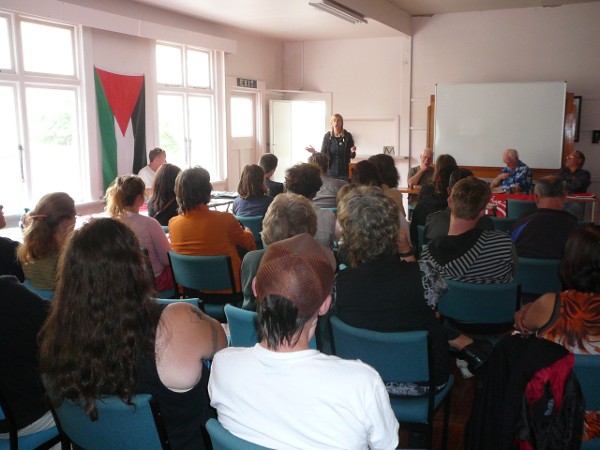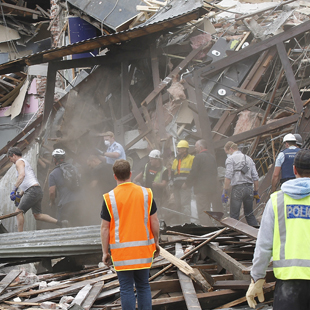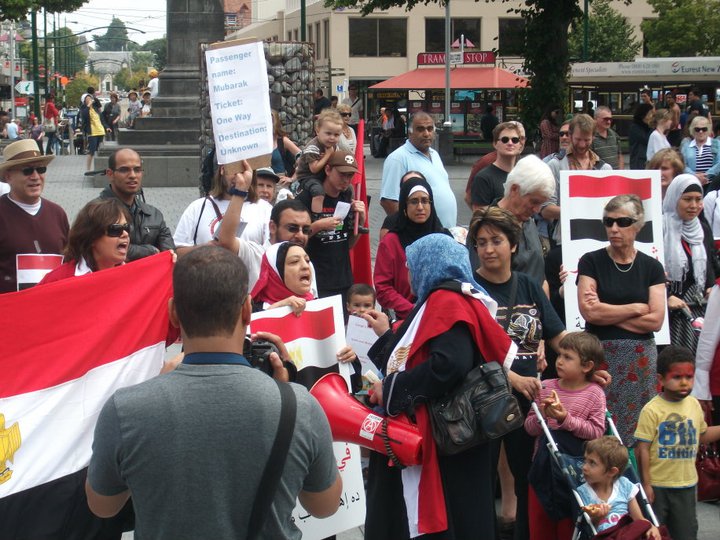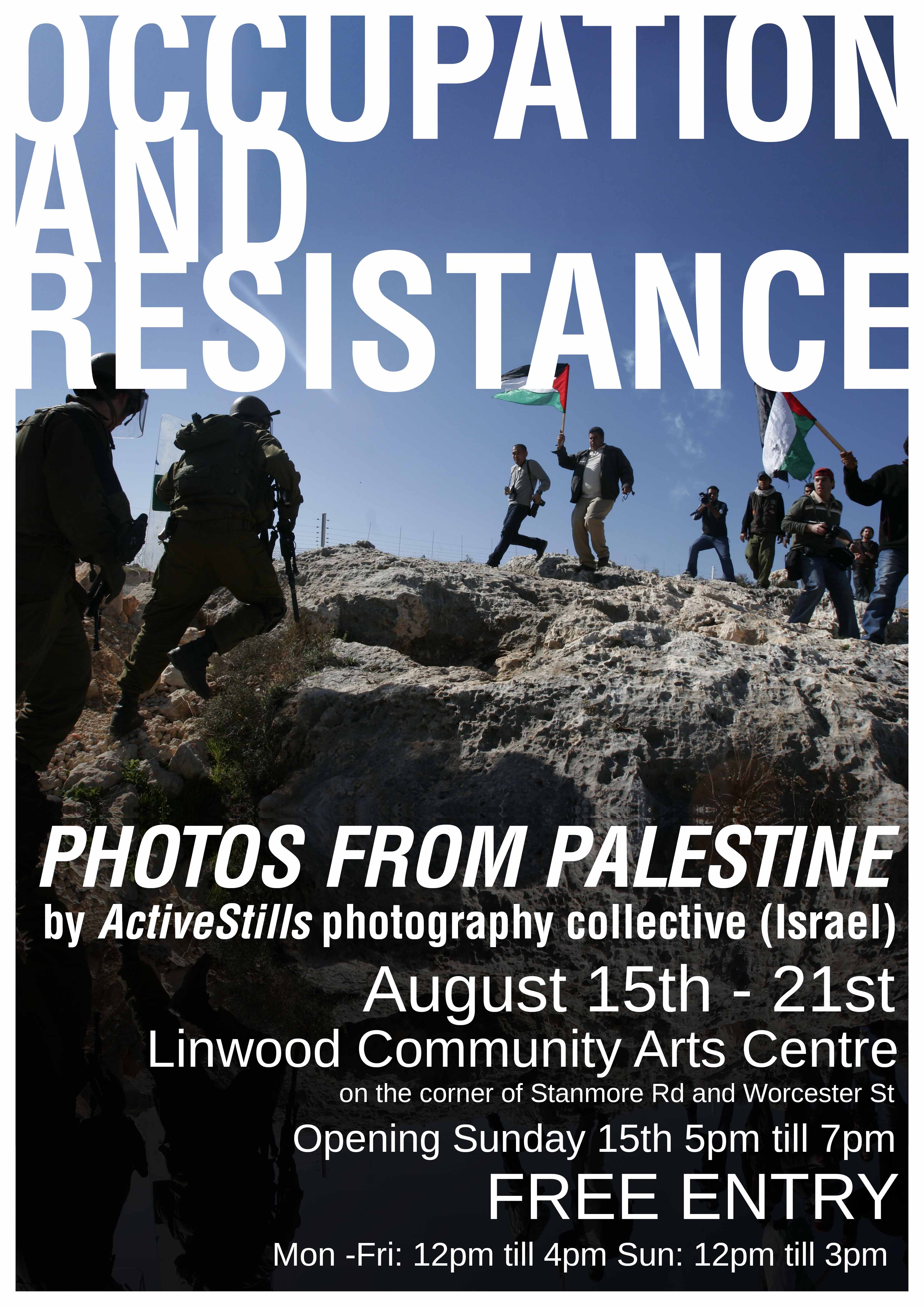To local and international friends, supporters, and readers,
Yesterday, February 22, an immense earthquake hit Christchurch, New Zealand’s third largest city. Currently there are 55 confirmed dead, 20 unidentified bodies, and an estimated 300 missing. The quake occurred at 12.50pm and was followed shortly after by a major aftershock.
This is the second major earthquake to strike Christchurch in 5 months. This more recent quake – 6.3 – in magnitude was far more destructive than the last, as it occurred only 10 Km south of
Christchurch at the shallow depth of 5 Km. It happened during the lunch hour of a working week day which has compounded human suffering and trauma.
As well as injury and loss of life there has been major damage to buildings, houses, and infrastructure. Soil liquefaction has damaged roads and transport. Originally there was an estimated 80% loss of power, as of mid-day today the estimate is now 50%. Currently three quarters of the city has no water. Phone lines and signal towers have also been wrecked or severely damaged. The Canterbury television building completely collapsed and has been one of the focal points for rescue efforts. There is concern that the Hotel Grand Chancellor- the tallest building in Christchurch – may still collapse from extreme buckling. The township of Lyttleton was at the epicenter of the earthquake and was extensively damaged.
Continue reading “Workers Party statement on Canterbury earthquake disaster Wednesday February 23, 2011”
The implications of the Terrorism Suppression Act
Jared Phillips, Co-ordinating editor, The Spark

Public meetings have been held in New Zealand’s major centres to build opposition to increasing state power being used against activists and oppressed groups. Early this year the Workers Party and the Popular Front for the Liberation of Palestine (PFLP) Solidarity Campaign hosted one such forum in Christchurch with a focus on the implications of the Terrorism Suppression Act (TSA). Five speakers – Michael Knowles, Valerie Morse, Murray Horton, Paul Piesse, and Michael Walker – explored the local and international dimensions.
Continue reading “The implications of the Terrorism Suppression Act”
Christchurch demonstration in support of the Egyptian revolution this weekend
Following on from last weekends demonstration another protest rally in solidarity with the uprising in Egypt has been organied for midday this Saturday (Febuary 12) in Cathedral Square. Come raise awareness and support the Millions of Egyptians taking to the streets!. [Facebook page]
The following video was taken at last weeks demonstration.
[youtube=http://www.youtube.com/watch?v=646JrH-j06k]
Freedom of expression @ work – a short interview with Julie Tyler

Friday January 4, Burger King held a disciplinary meeting against Dunedin employee Julie Tyler. Her alleged misconduct was the posting of the following sentence on a friend’s Facebook wall, ‘Real jobs don’t underpay and overwork like BK does’. Julie’s union, Unite, her friends, and other workers successfully built up public opposition against BK before the initial disciplinary meeting took place.
At the initial meeting Burger King adjourned the case until today, saying they were seeking further legal advice. During the adjournment BK’s censorship of staff members became a national media issue. BK New Zealand’s own Facebook page was jammed by comments of protest. Other Facebook groups – which attracted heavy traffic – were created and used in Julie’s defence. An informational picket was put on at Julie’s store today during the second disciplinary meeting. As a result the company has threatened legal action against Unite Union but Unite has replied that it will not be silenced.
The case not only raises issues surrounding the use of social media, it has also drawn attention to very basic working class issues such as freedom of expression and the right of workers to take action. Later on today we had the opportunity to have a quick word with Julie about how the case has unfolded so far:
Continue reading “Freedom of expression @ work – a short interview with Julie Tyler”
What is WikiLeaks and what has it done?
In this article, Ian Anderson, a member of the Wellington branch of the Workers Party, looks back on the breaking of state secrets – including with regard to NZ’s role in Iraq – and how WikiLeaks has helped shape recent international events.
By now everyone with access to mainstream media has heard of WikiLeaks. Whether it’s the latest head-line from a leaked diplomatic cable, or a development in the Assange rape allegation drama, WikiLeaks is a centre-piece in media coverage. This article aims to give some background and analysis, to put the headlines in context.
Launched in March 2006, WikiLeaks relies on donations through the non-profit sector. Donations are processed by the Wau Holland Foundation in Germany, a non-profit organisation named after a “data philosopher” who developed notions such as hacker ethics. WikiLeaks is also registered through various other organisations internationally, many with only covert affiliations.
Like so many NGO-ist operations, WikiLeaks strives for political neutrality and does not have an explicitly anti-imperialist mandate. Until recently they used the following mission statement: “Our primary interests are oppressive regimes in Asia, the former Soviet bloc, sub-Saharan Africa and the Middle East, but we also expect to be of assistance to those in the West who wish to reveal unethical behaviour in their own governments and corporations.”
In its early days WikiLeaks exposed corruption in Kenya, and found itself in conflict with censorious Chinese authorities. However, the website ultimately shot to fame by exposing the machinations of Western imperialism. In April 2010, WikiLeaks released the first file from PFC Bradley Manning, a video nicknamed “Collateral Murder.” This video depicted the US army murdering Iraqi civilians and firing upon reporters in a 2007 airstrike. In the weeks following this leak “WikiLeaks” was the search-term with the most significant growth on Google.
In his position as Intelligence Analyst for the US military, Manning had leaked two videos of airstrikes and about 260,000 diplomatic cables – many still unreleased by WikiLeaks. After former hacker Adrian Lamo blew the whistle, Manning was arrested and placed in solitary confinement. WikiLeaks continues to release the cables in batches, despite various attempts to shoot the messenger.
Pike River update: Compensation and investigation
By Byron Clark (Christchurch branch WP member)
‘‘I know a number of external parties who have expressed interest in the asset”
These were the words of Pike River Coal chairman John Dow, quoted in The Press on January 14th in an article where the main topic was the police decision to ‘pull the plug’ on attempts to recover the bodies of twenty nine miners from the Pike River mine. It’s a strange world we live in where “asset” and “mass grave” can be interchangeable. With the police ending their recovery attempt, responsibility for the mine lies with the receivers, PricewaterhouseCoopers. Receiver John Fisk told Radio New Zealand that they have about $10 million in cash, plus a number of assets above the ground and in the mine. However, if there is not enough money to re-enter the mine, the land will be handed back to the government. If that happens, the Department of Conservation is most likely to assume control of the mine, and responsibility for the bodies of the workers still encased within it.
Continue reading “Pike River update: Compensation and investigation”
Egypt fights against dictatorship
The following is the text of a leaflet distributed by Workers Party members at demonstrations held accross New Zealand in solidarity with the uprising in Egypt.
The Arab world is on fire. The people of the Middle East are rising up against the Western supported dictatorships. Suddenly a situation that has existed quite comfortably for the last forty years has been turned on its head.
When Iran burst into revolt in 2009 over the rigged elections, the governments of the ‘West’ could not do enough to encourage the ferment. But the situation in Egypt is very different, because Egypt is the West’s most important Arab ally in the region. Each year the regime receives more than $2 billion dollars in US “aid”. When Obama states that he is “calling upon Egyptian authorities to refrain from any violence against peaceful protesters”, he is referring to the weapons and munitions that the US has supplied over the last 30 years.
Palestine Photo Exibition in Christchurch
Does New Zealand need a population policy for the benefit of the environment?
This talk was originally given by Byron Clark at Marxism 2010, as part of a debate with John Robinson, a former academic who has researched and written on rising population.
A Few people here may be familiar with the enviornmental sociologist Allen Schnaiberg, Schnaiberg is the co-author of The Treadmill of Production: Injustice and Unsustainability in the Global Economy and a number of other works, tomorrow [June 6th] is the one year anniversary of his death and I would like to acknowledge the contributions he made to radical theory about society and the environment. Schnaiberg coined the term ‘populationism’ to describe the various movements aiming for a reduction in population, and wrote in his 1980 book ‘The Environment from Surplus to Scarcity’ that populationism is a social ideology that attributes social ills to the number of humans. While agreeing that there is of course a limit to the number of people the planet can hold, modern populationism and its historical precedents, says Schnaiberg are regressive, reactionary, and at times racist.
I’m going to talk about how the environmental destruction we are witnessing today, notably climate change, is not something we can attribute to ‘to many humans’ but something we can attribute to our social and economic system. Because of this, New Zealand does not need a population policy to benefit the environment, but can, with the right type of social change, sustain a much larger population.
Continue reading “Does New Zealand need a population policy for the benefit of the environment?”
Mining National Parks – Class and Conservation
Ever since Energy and Resources Minister Gerry Brownlee and Conservation Minister Kate Wilkinson released a proposal to open up 7058ha of land presently in Schedule 4 of the Crown Minerals Act for mining, opposition to the plan has been building. The issue got attention around the world, including from North America’s largest conservation organisation the Sierra Club. “You have the responsibility to protect New Zealand’s wild heritage not only for the enjoyment of future generations but also for the protection and conservation of the Earth’s ever shrinking biodiversity,” wrote Richard Cellarius, the club’s international vice-president, in a letter sent to the Prime Minister and the Ministers of Energy and Trade. “Long-term protection should not be sacrificed for immediate commercial gain.”.
Continue reading “Mining National Parks – Class and Conservation”




